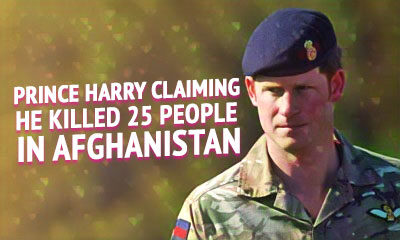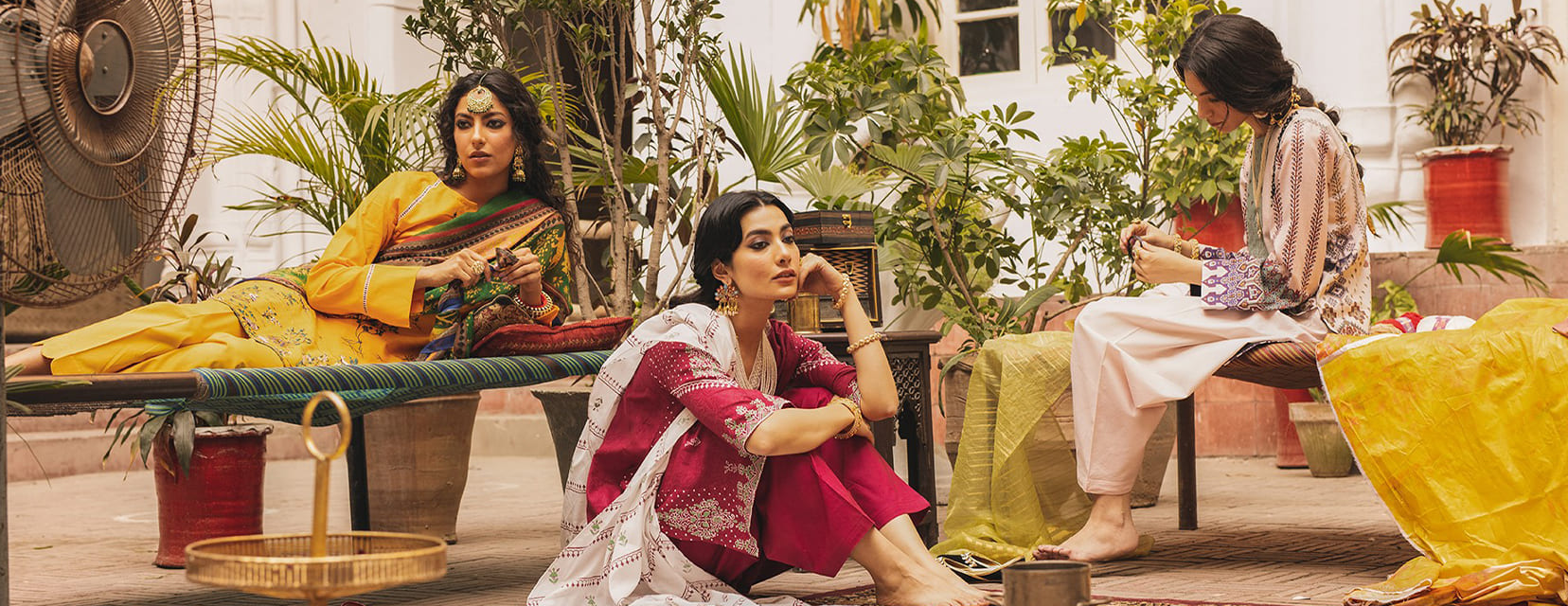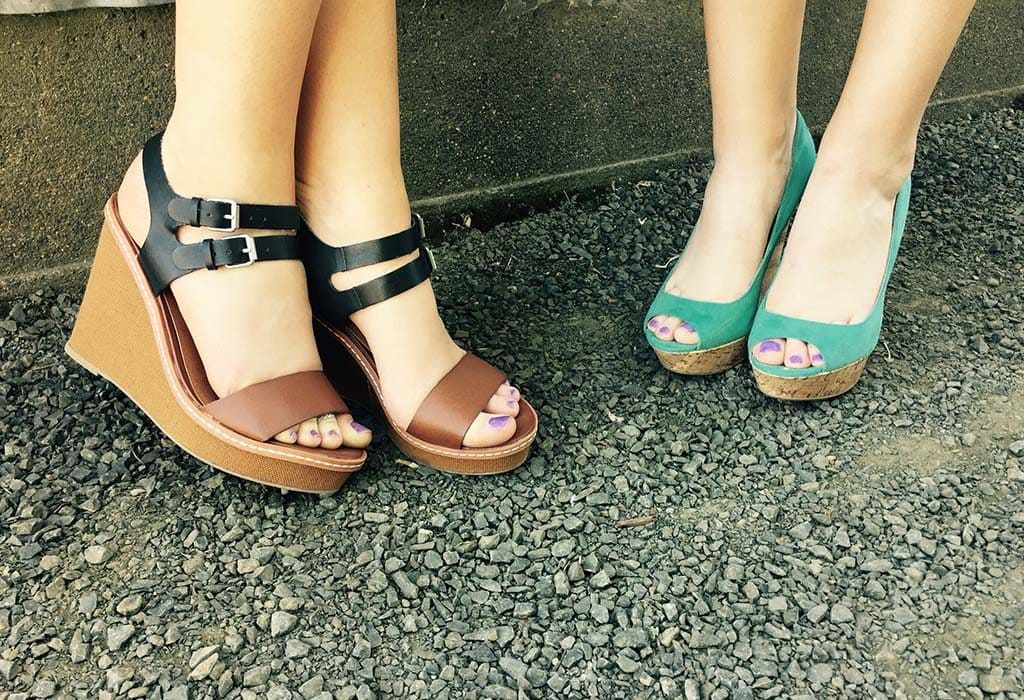Quotes
Abdul Sattar Edhi Quotes
Abdul Sattar Edhi is not only known as the famous Pakistani philanthropist but also he is famously known as the “Angel of Mercy” for all his extraordinary services for humanity. Edhi was a big man with a big heart and he devoted his life to helping others out of pure kindness, love, and concern for people’s suffering. He has created an endless list of humanitarian associations, along with hundreds of free medical centers throughout Pakistan that have assisted millions.
Abdul Sattar Edhi’s efforts have earned him his place in history & no matter what the religion or beliefs you may subscribe to; it is hard to ignore the fact that every time someone speaks of great generosity and kindheartedness, his name will undoubtedly come up. To help share this vision to other people we have listed these amazing quotes by Sir Edhi that entail his amazing character.
Table of Contents
Abdul Sattar Edhi Quotes
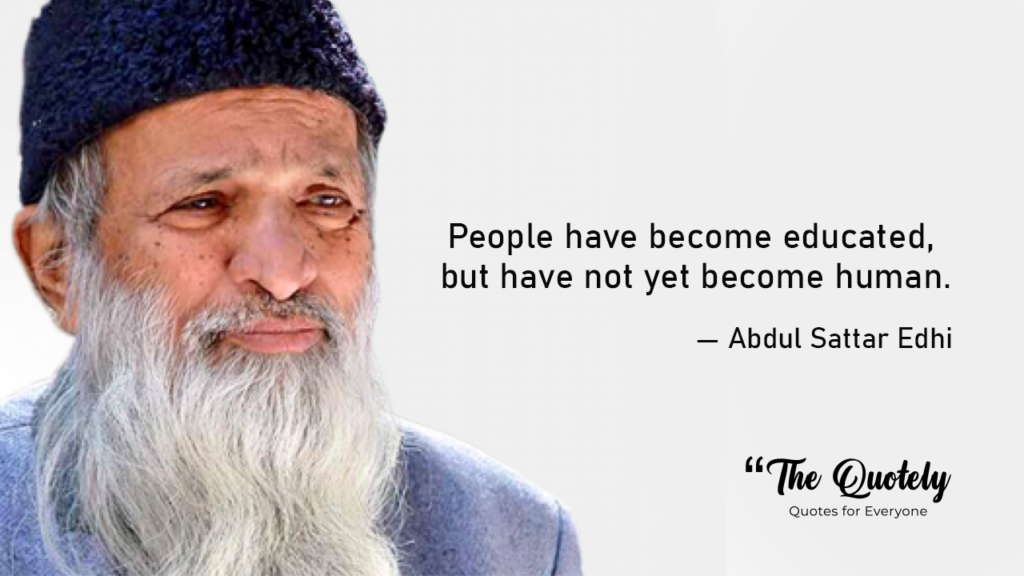
- “People have become educated, but have not yet become human.”― Abdul Sattar Edhi
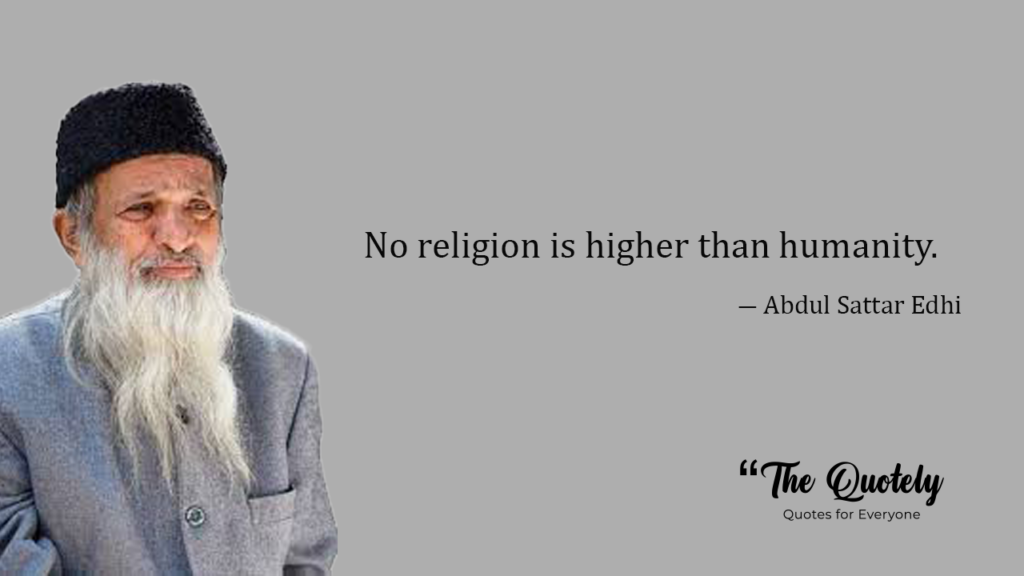
- “No religion is higher than humanity.”― Abdul Sattar Edhi
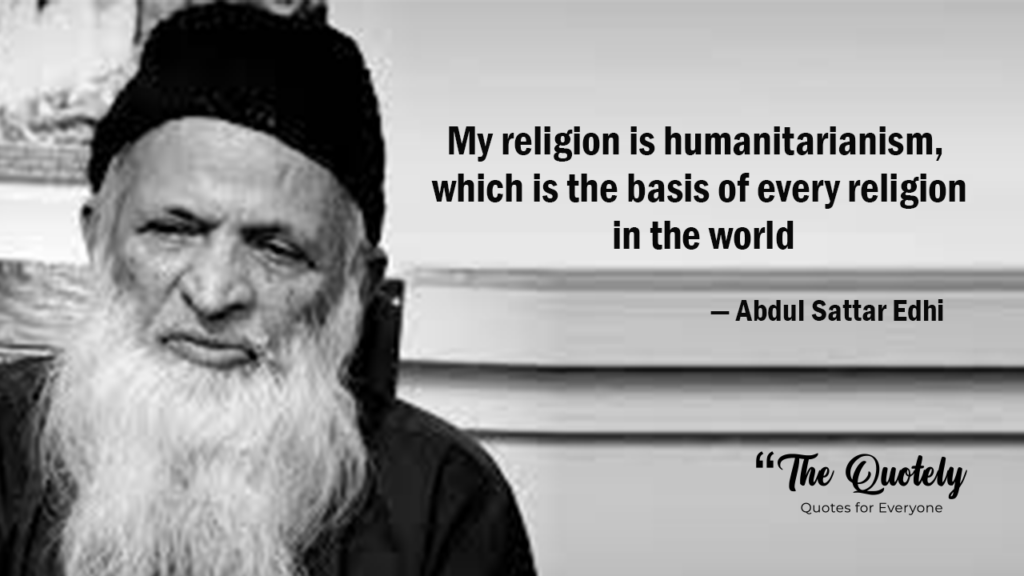
- “My religion is humanitarianism, which is the basis of every religion in the world” ― Abdul Sattar Edhi
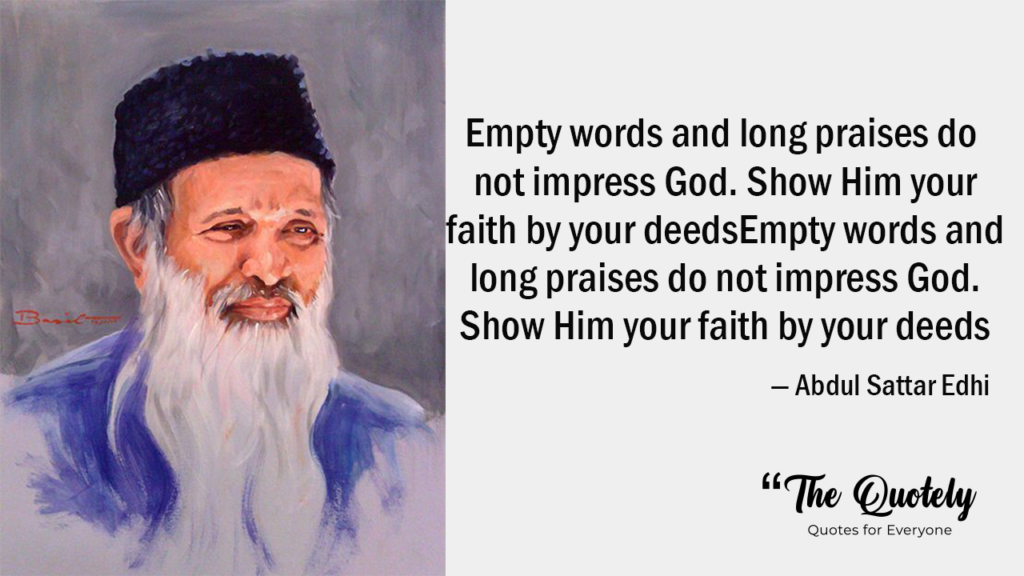
- “Empty words and long praises do not impress God. Show Him your faith by your deeds” ― Abdul Sattar Edhi

- “The dead has only one place to go… up. Wherever you bury them, they will go the same way, up” ― Abdul Sattar Edhi
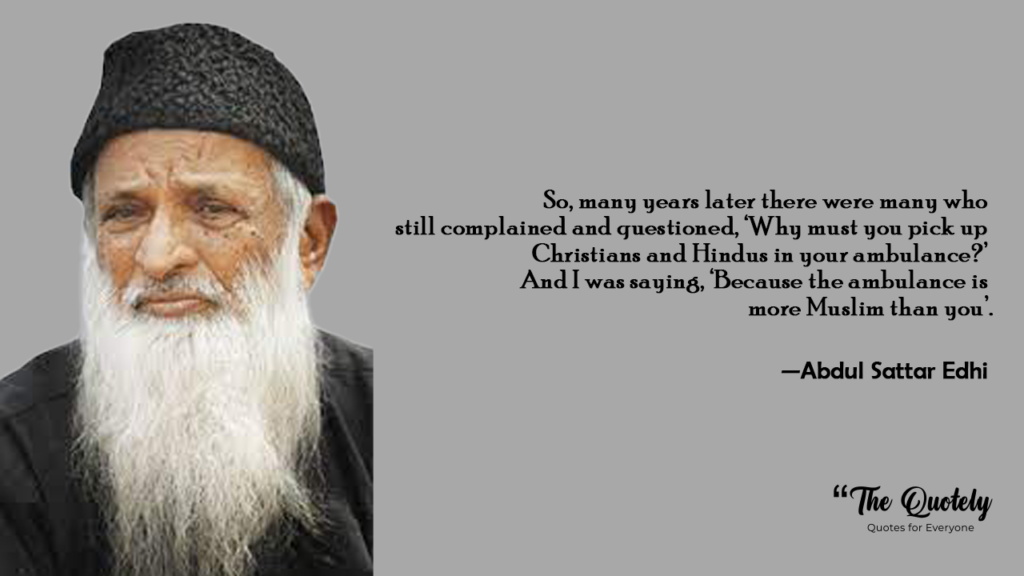
- “So, many years later there were many who still complained and questioned, ‘Why must you pick up Christians and Hindus in your ambulance?’ And I was saying, ‘Because the ambulance is more Muslim than you’.” ― Abdul Sattar Edhi
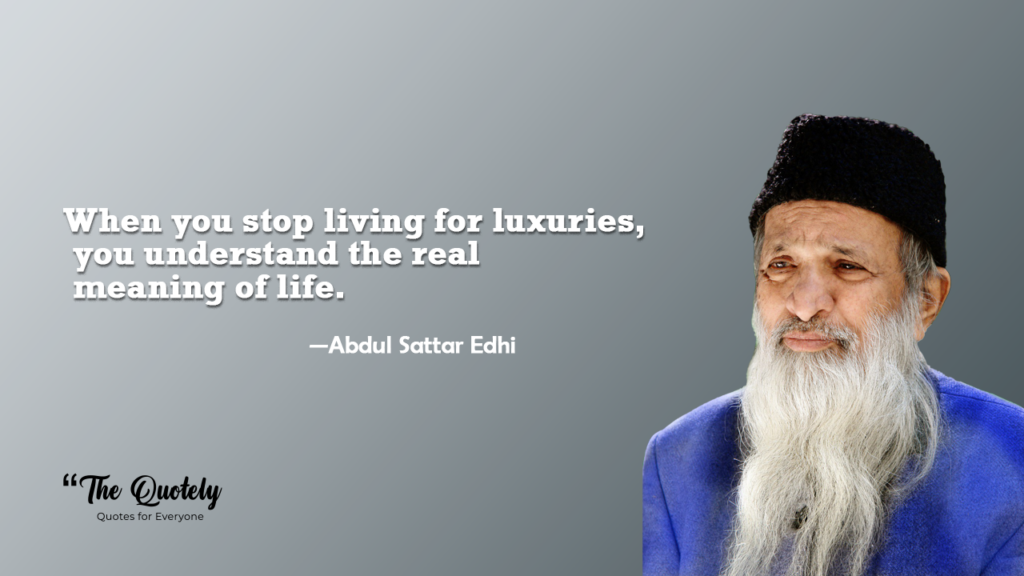
- “When you stop living for luxuries, you understand the real meaning of life.” ― Abdul Sattar Edhi
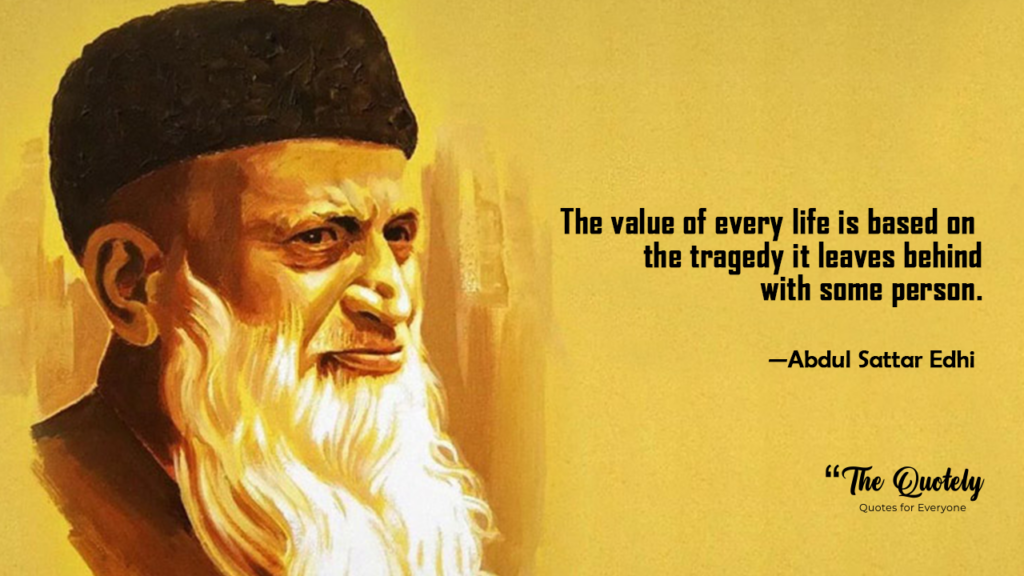
- “The value of every life is based on the tragedy it leaves behind with some person.” ― Abdul Sattar Edhi
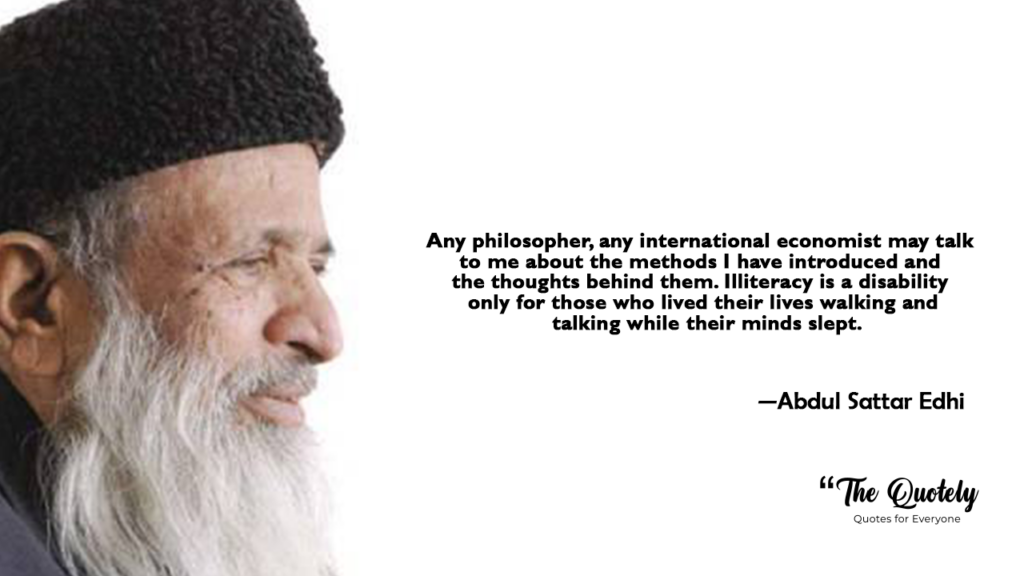
- “Any philosopher, any international economist may talk to me about the methods I have introduced and the thoughts behind them. Illiteracy is a disability only for those who lived their lives walking and talking while their minds slept.” ― Abdul Sattar Edhi
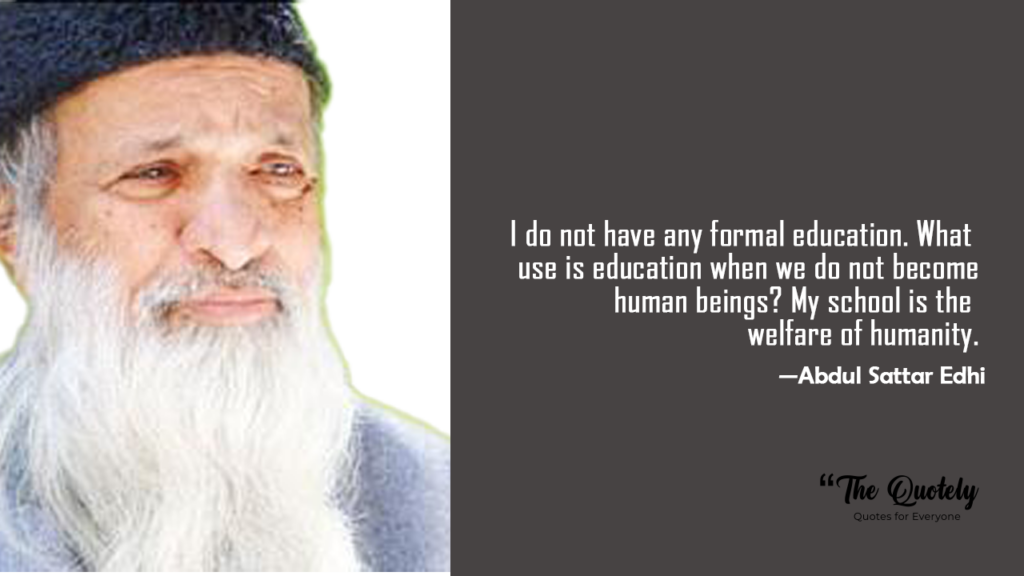
- “I do not have any formal education. What use is education when we do not become human beings? My school is the welfare of humanity.”― Abdul Sattar Edhi
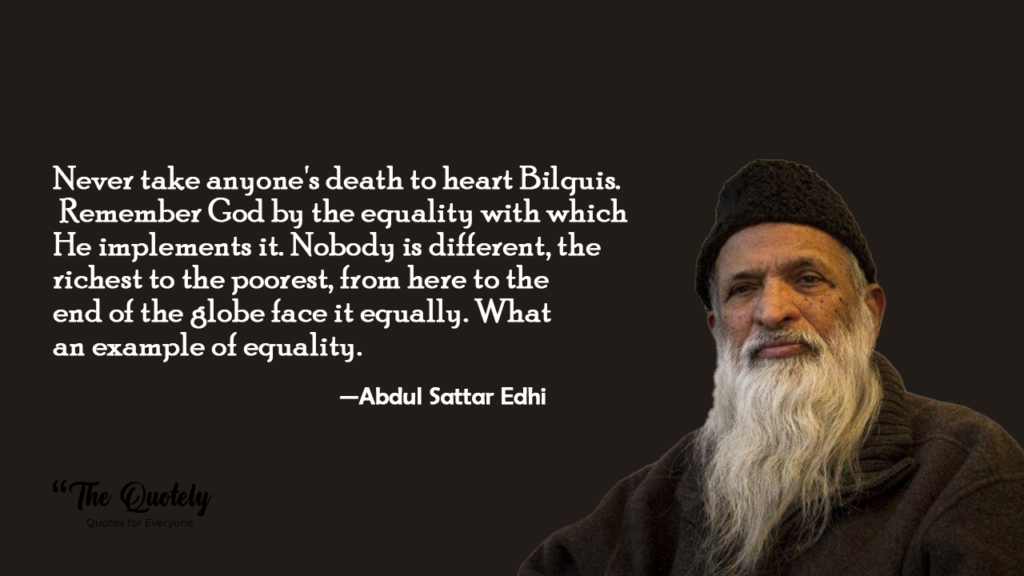
- “Never take anyone’s death to heart Bilquis. Remember God by the equality with which He implements it. Nobody is different, the richest to the poorest, from here to the end of the globe face it equally. What an example of equality.”― Abdul Sattar Edhi
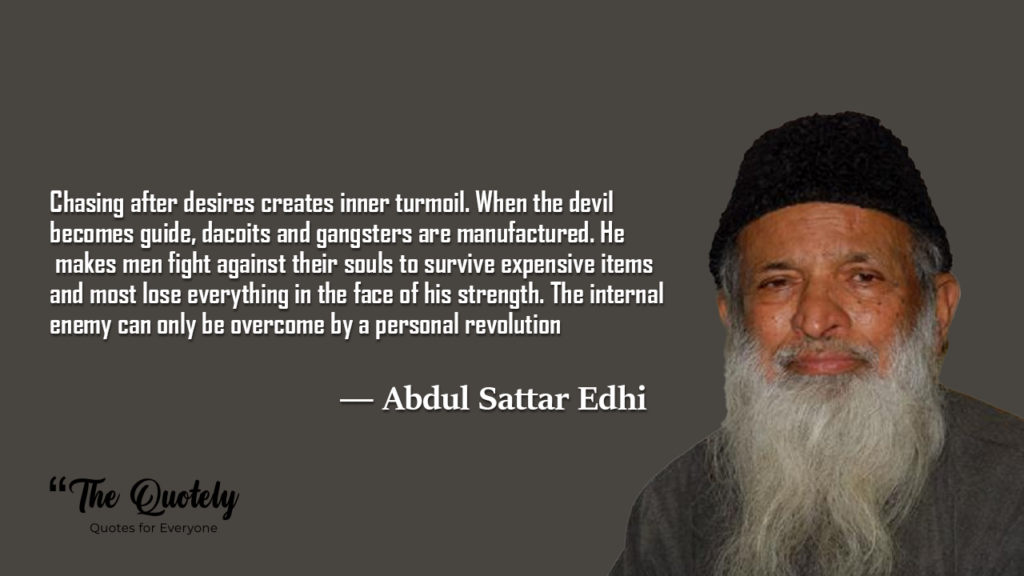
- “Chasing after desires creates inner turmoil. When the devil becomes guide, dacoits and gangsters are manufactured. He makes men fight against their souls to survive expensive items and most lose everything in the face of his strength. The internal enemy can only be overcome by a personal revolution.” ― Abdul Sattar Edhi
Quotes by the Richest Poor Man of The World
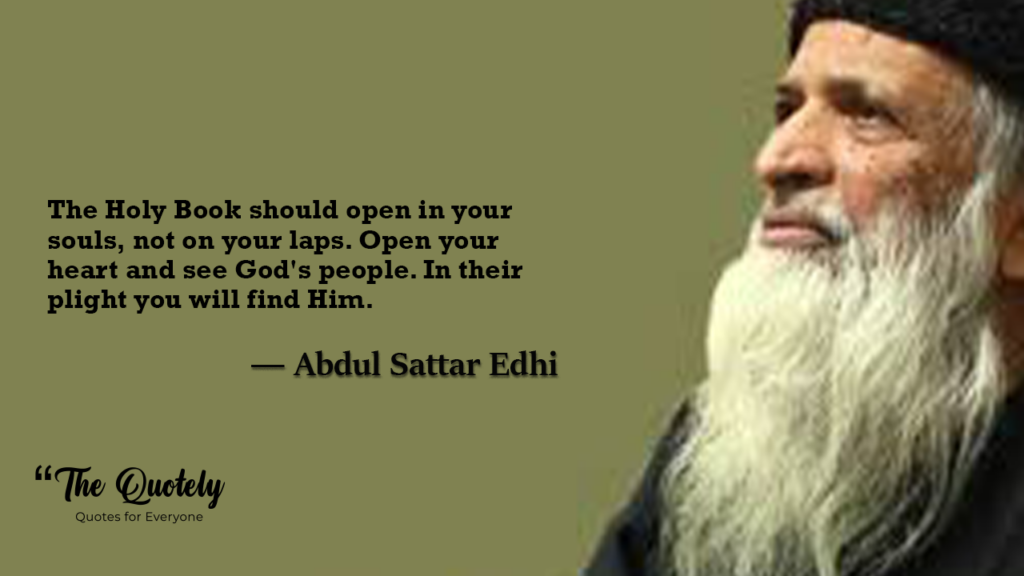
- “The Holy Book should open in your souls, not on your laps. Open your heart and see God’s people. In their plight you will find Him.” ― Abdul Sattar Edhi
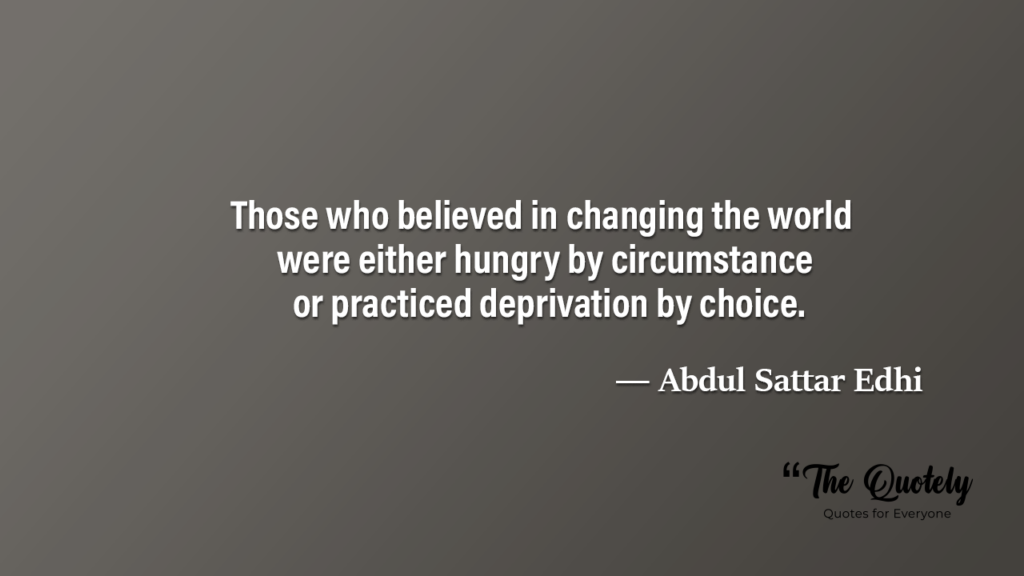
- “Those who believed in changing the world were either hungry by circumstance or practiced deprivation by choice.”― Abdul Sattar Edhi
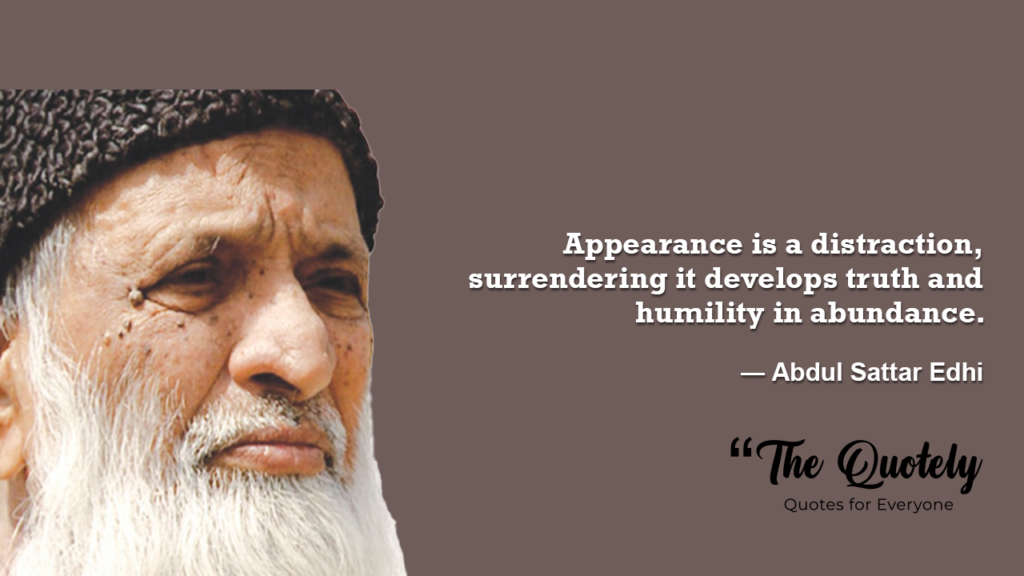
- “Appearance is a distraction, surrendering it develops truth and humility in abundance.”― Abdul Sattar Edhi
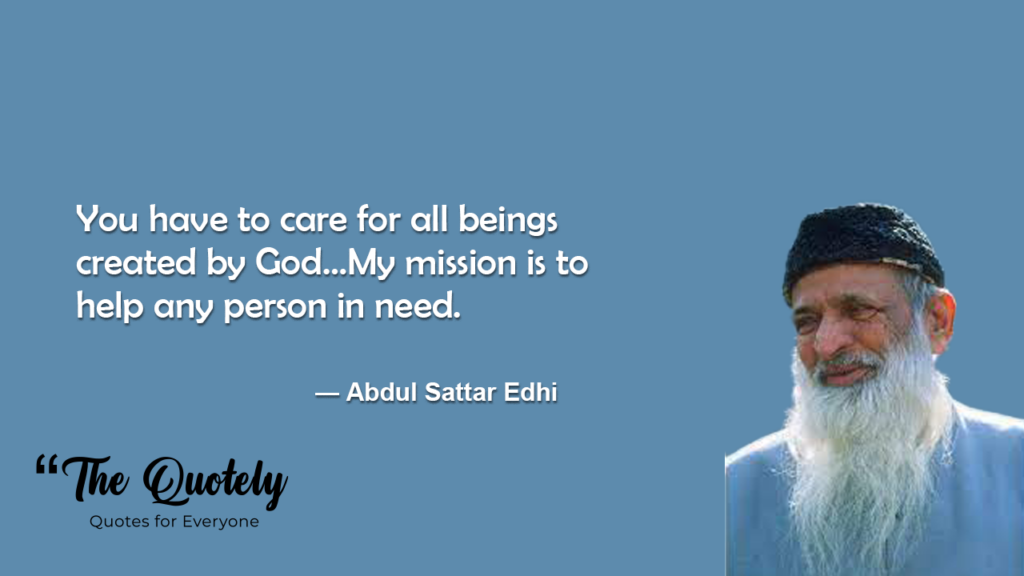
- “You have to care for all beings created by God…My mission is to help any person in need.”― Abdul Sattar Edhi
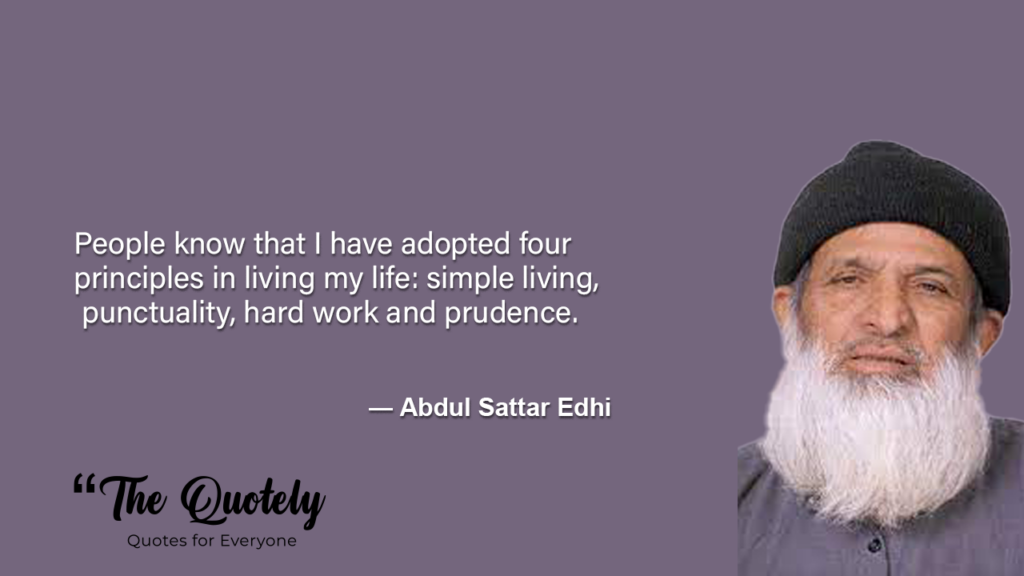
- “People know that I have adopted four principles in living my life: simple living, punctuality, hard work and prudence.”― Abdul Sattar Edhi
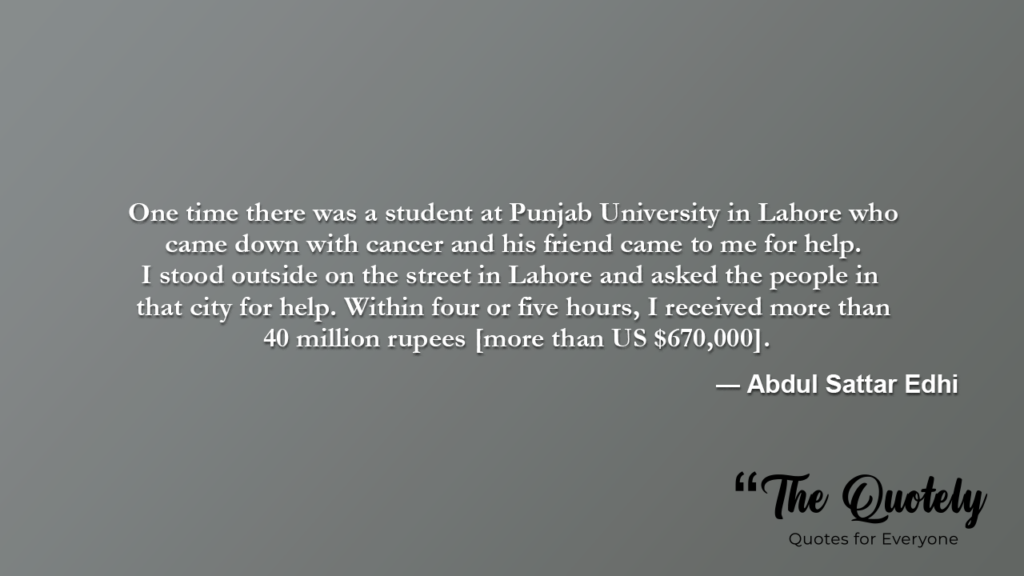
- “One time there was a student at Punjab University in Lahore who came down with cancer and his friend came to me for help. I stood outside on the street in Lahore and asked the people in that city for help. Within four or five hours, I received more than 40 million rupees [more than US $670,000].”― Abdul Sattar Edhi
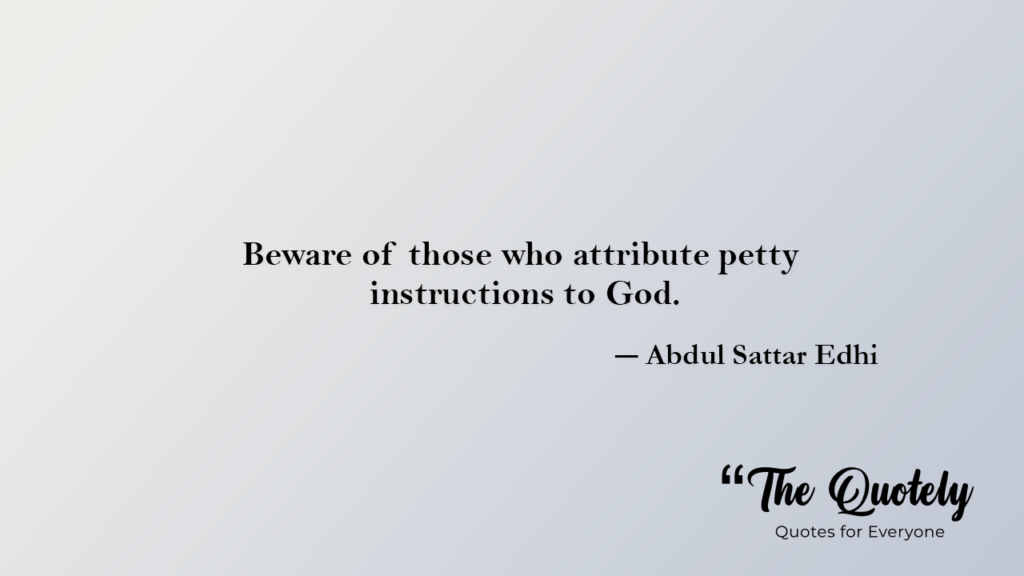
- “Beware of those who attribute petty instructions to God.” ― Abdul Sattar Edhi
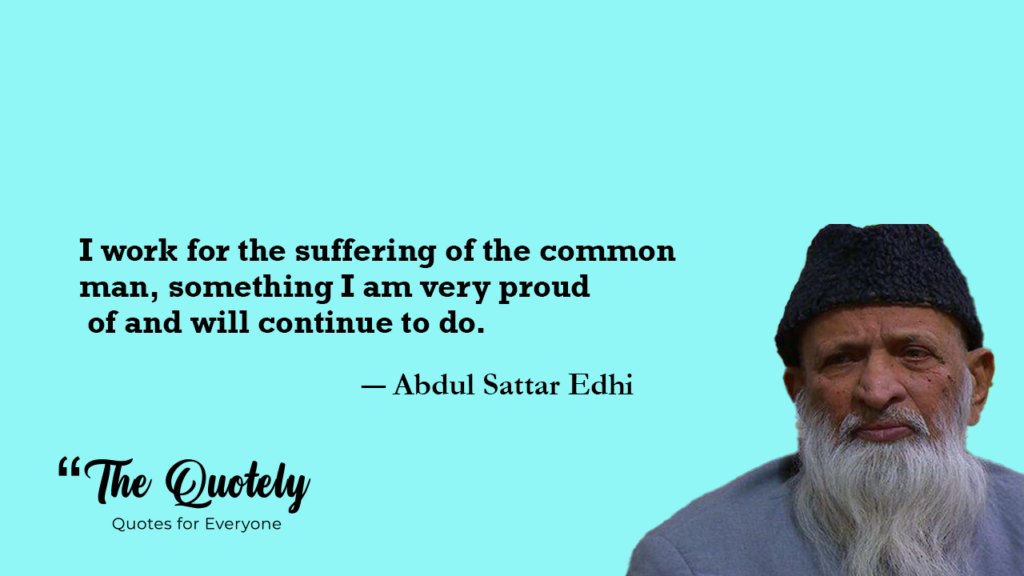
- “I work for the suffering of the common man, something I am very proud of and will continue to do.”― Abdul Sattar Edhi
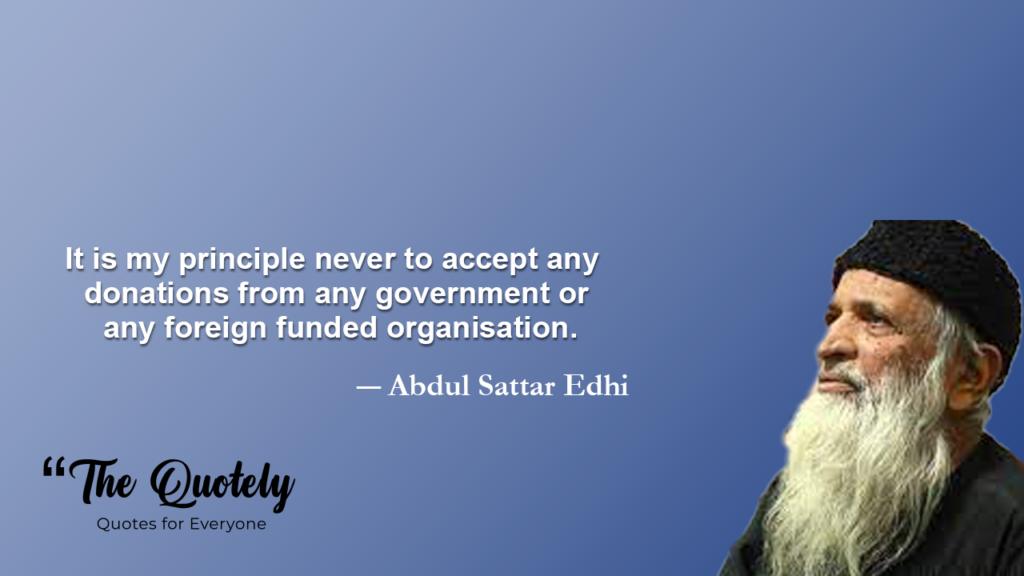
- “It is my principle never to accept any donations from any government or any foreign funded organisation.”― Abdul Sattar Edhi
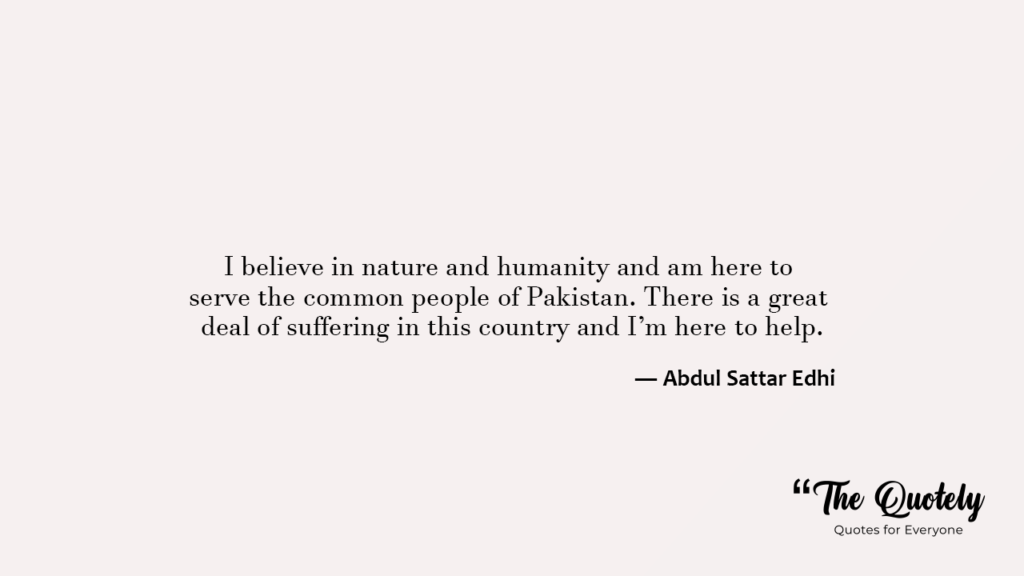
- “I believe in nature and humanity and am here to serve the common people of Pakistan. There is a great deal of suffering in this country and I’m here to help.”― Abdul Sattar Edhi
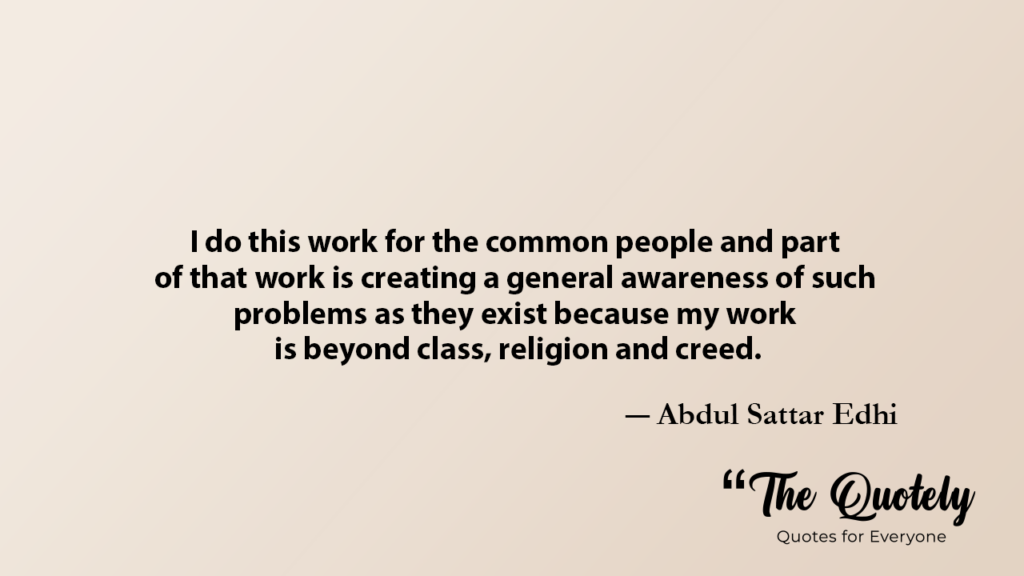
- “I do this work for the common people and part of that work is creating a general awareness of such problems as they exist because my work is beyond class, religion and creed.”― Abdul Sattar Edhi
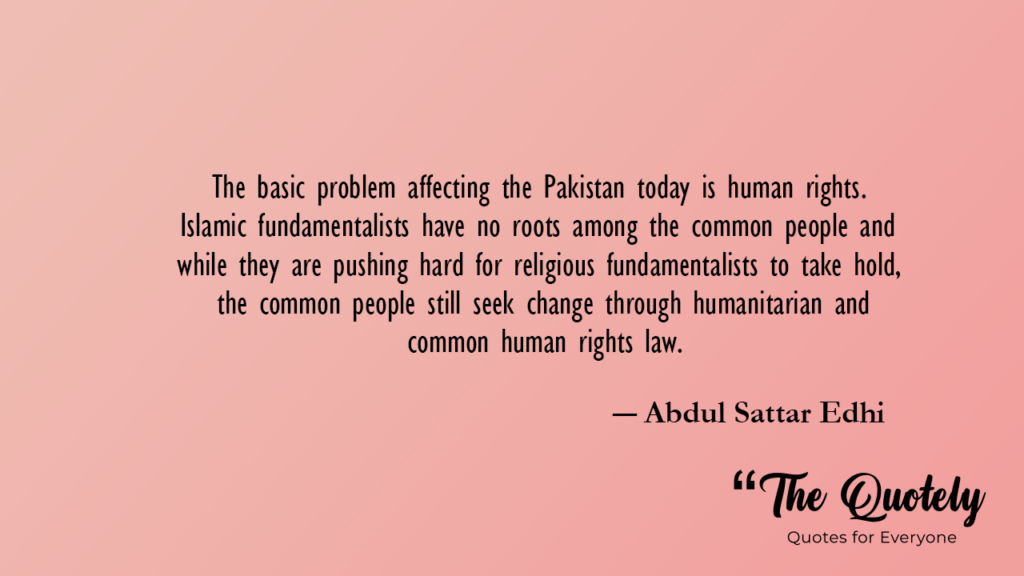
- “The basic problem affecting the Pakistan today is human rights. Islamic fundamentalists have no roots among the common people and while they are pushing hard for religious fundamentalists to take hold, the common people still seek change through humanitarian and common human rights law.”― Abdul Sattar Edhi
You may like: Fake Family Quotes, Bad Bitch Quotes, Freaky Quotes, Inspirational Quotes for Single Women, Happy Birthday Cutie Pie, Country Girl Quotes
Short Quotes By Abdul Sattar Edhi
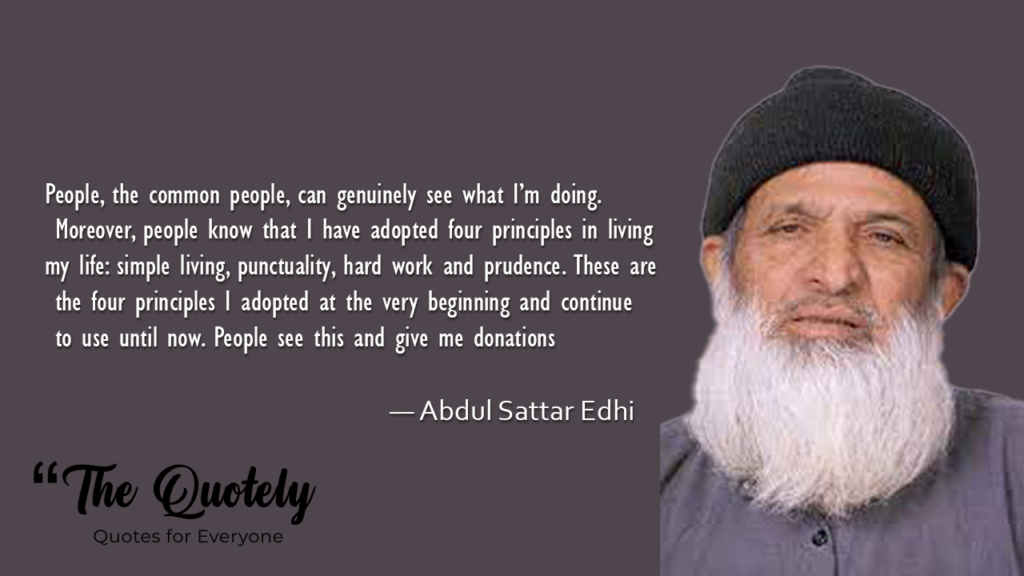
- People, the common people, can genuinely see what I’m doing. Moreover, people know that I have adopted four principles in living my life: simple living, punctuality, hard work and prudence. These are the four principles I adopted at the very beginning and continue to use until now. People see this and give me donations. ― Abdul Sattar Edhi

- Our motto is ‘from cradle to grave.’ Unwanted babies are delivered to us through our cradle programme, where we work to find new homes for them for parents desiring children. In addition to our healthcare programmes, we also have a programme for burying the dead, meeting all the necessary expenses for those who are unable to do so. ― Abdul Sattar Edhi
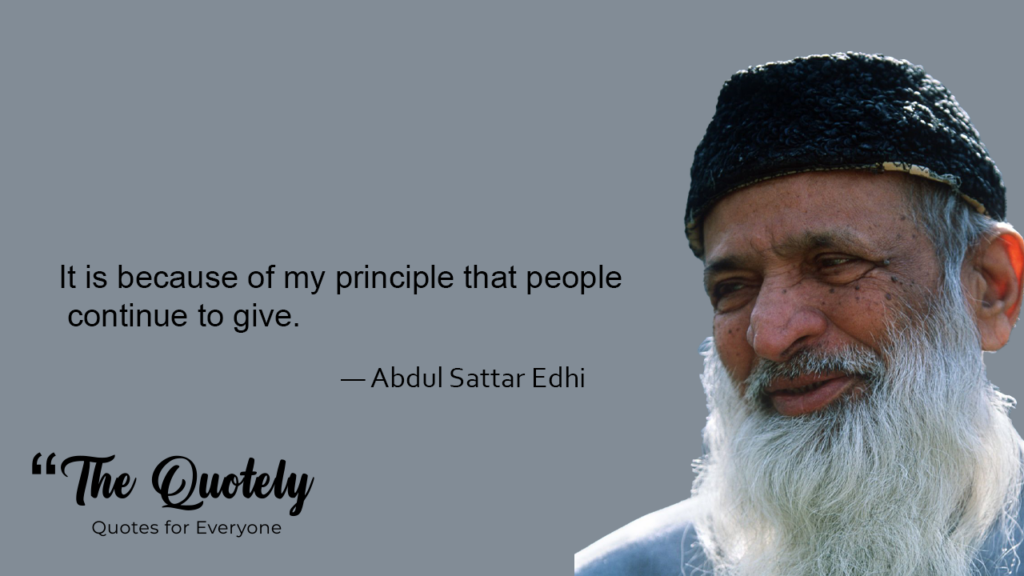
- “It is because of my principle that people continue to give.”― Abdul Sattar Edhi
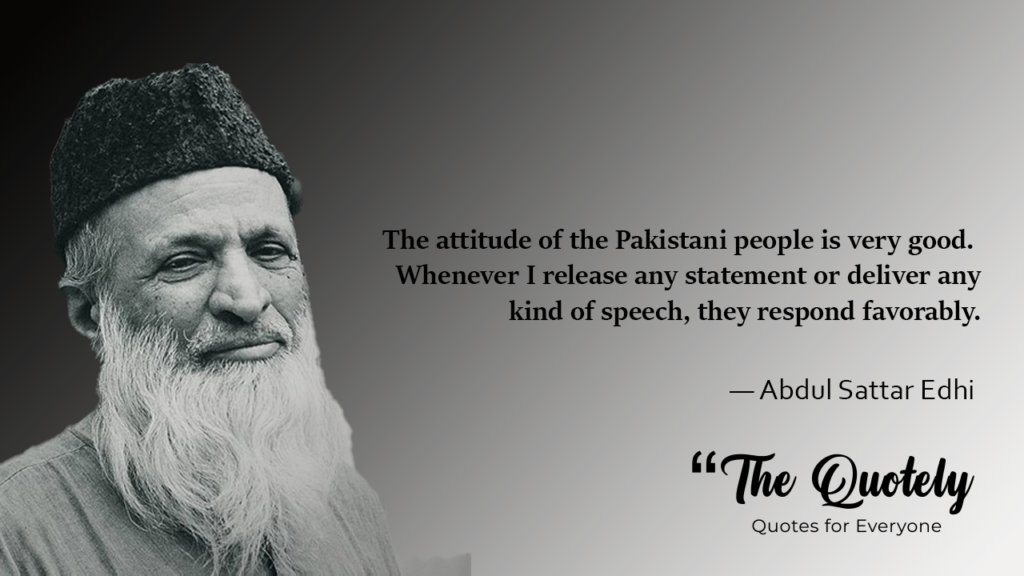
- “The attitude of the Pakistani people is very good. Whenever I release any statement or deliver any kind of speech, they respond favorably.”― Abdul Sattar Edhi
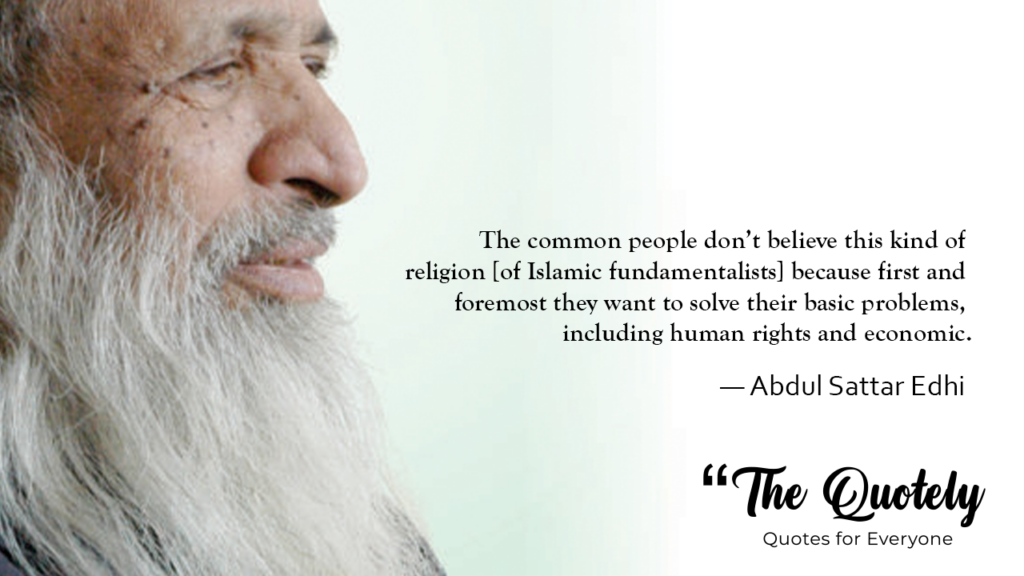
- “The common people don’t believe this kind of religion [of Islamic fundamentalists] because first and foremost they want to solve their basic problems, including human rights and economic.”― Abdul Sattar Edhi
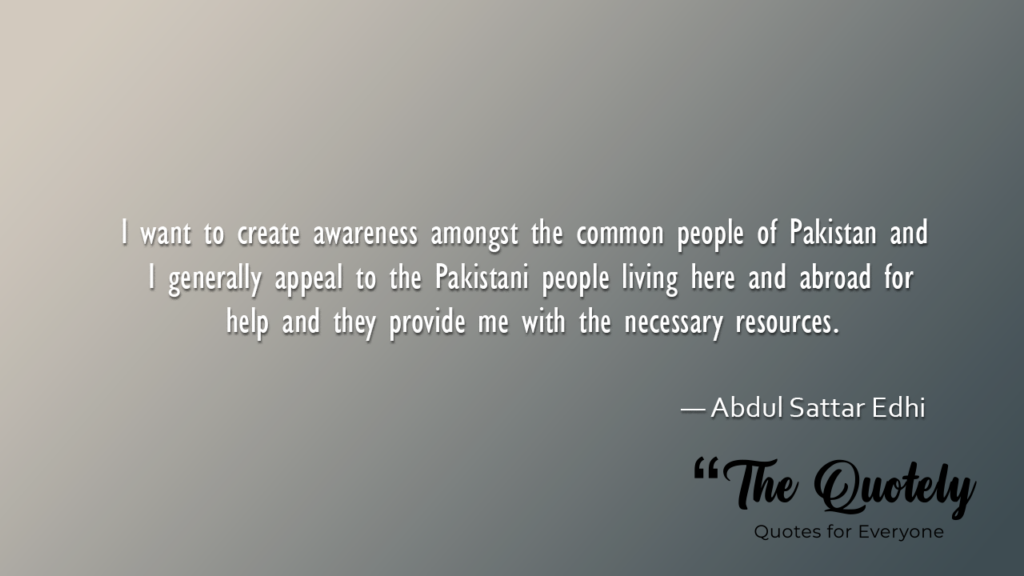
- “I want to create awareness amongst the common people of Pakistan and I generally appeal to the Pakistani people living here and abroad for help and they provide me with the necessary resources.” ― Abdul Sattar Edhi
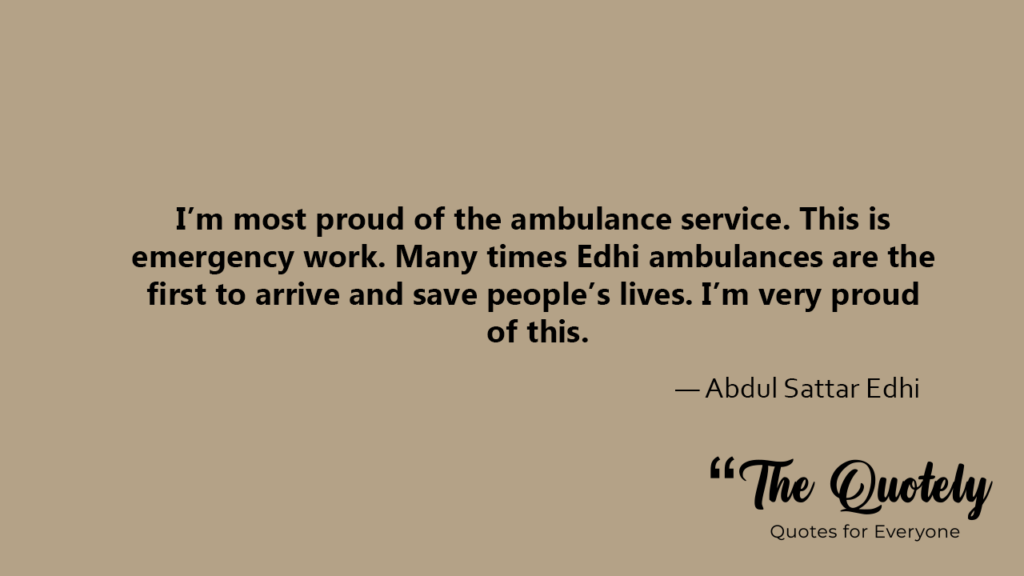
- “I’m most proud of the ambulance service. This is emergency work. Many times Edhi ambulances are the first to arrive and save people’s lives. I’m very proud of this.”― Abdul Sattar Edhi
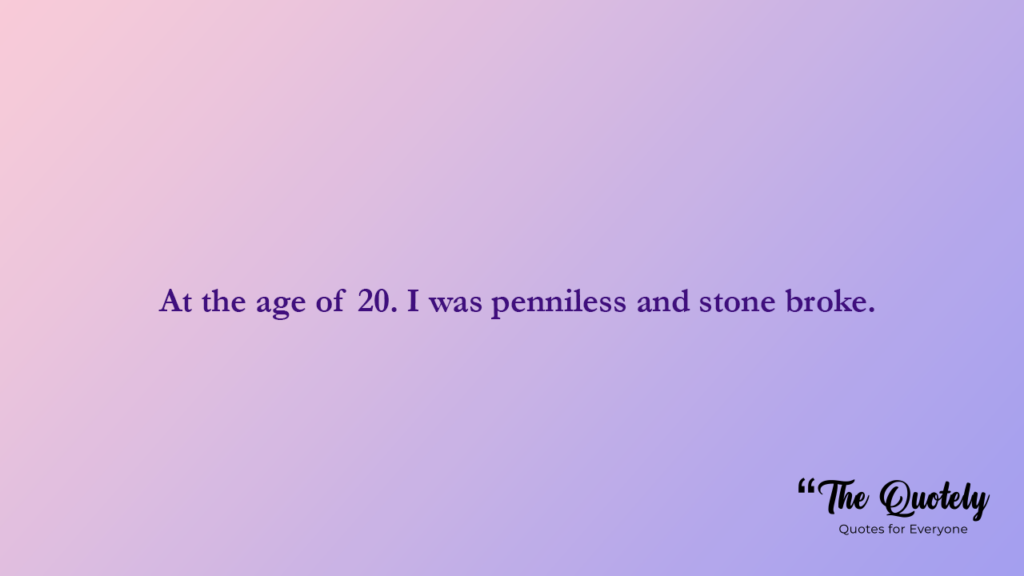
- At the age of 20. I was penniless and stone broke.
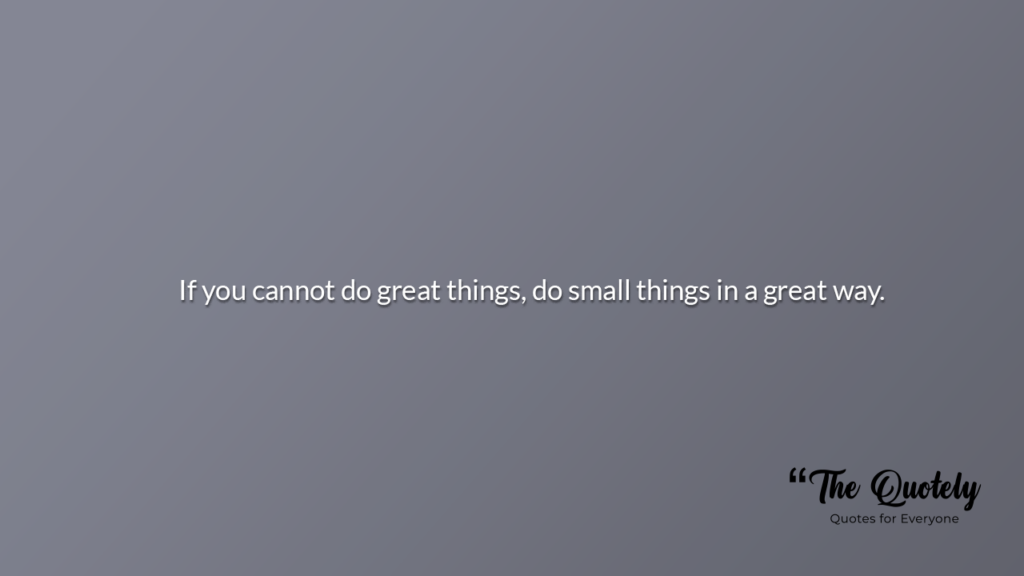
- If you cannot do great things, do small things in a great way.
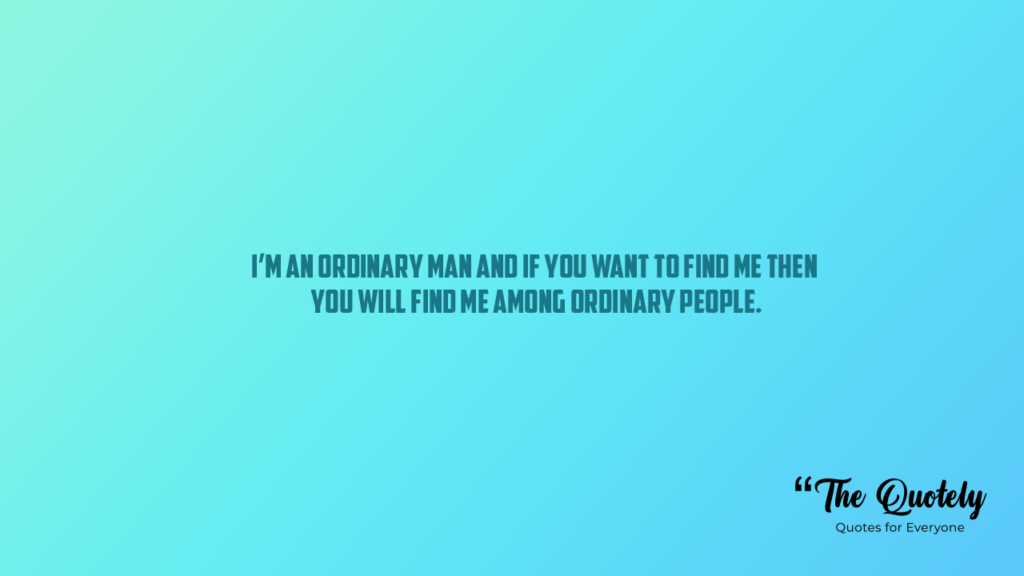
- I’m an ordinary man and if you want to find me then you will find me among ordinary people.
Abdul Sattar Edhi Biography
Abdul Sattar Edhi was a generous person who started social service from a dispensary in Karachi in 1951. He now has ambulance service centres for orphaned children and the elderly and rehab centres for drug addicts in all four provinces. He was born in the Indian city of Bantuwa on February 28, 1928. After India was split into two countries in 1947, he moved to Karachi with his family. He showed how to help people for more than 60 years. Edhi Sahab was the kind of person who kept doing great things for people as long as he lived and became a model for the world after he died. He didn’t have a team to handle the media or a state advisor, but people trusted him anyway.
He was called “Baba E Khidmat,” “Rehmat Ka Farishta,” and “Mother Teresa of Pakistan” by people all over the world. He was such a simple man with a great personality. He really did give his life to helping poor and helpless people. Everyone has honour and respect for him. Edhi learned to help others when he was young, and this was the key to his success later in life. He worked for 65 years to help people who were in trouble. More than 20 national and international awards have been given to him. Several private groups have given Edhi Sahab honorary degrees and awards, such as the Distinguished Service Award in Pakistan, the Lenin Peace Prize, and the Pakistan Human Rights Award. He is also in the “Guinness Book of World Records” because he runs the biggest ambulance service in the world.
Early life and education
When he was 11, his mother had a stroke that left her paralysed. From then on, he spent a lot of time taking care of his mother. This gave him more understanding and sympathy for people who are sick, mentally ill, or have other problems. When he was 19, his mother died. He stopped going to school and got a job at a clothes store. Edhi, who works in business, wanted to raise money, but his dream was to help the poor, not to help business. He didn’t go to school past high school, but he used to say, “The sorrows of the world have taught me and given me wisdom.”
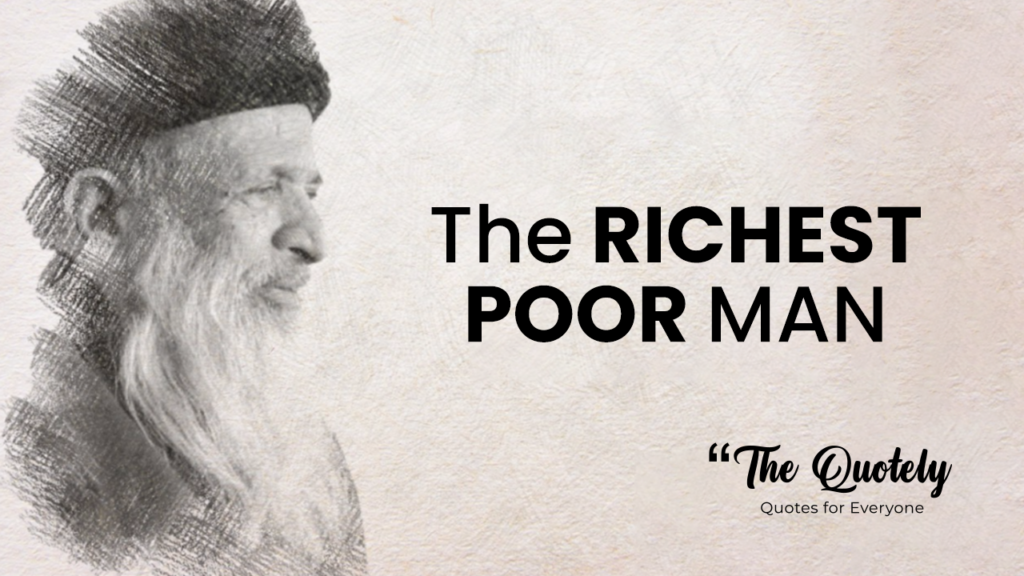
In 1947, India was split into two countries, and Edhi and his family moved to Pakistan. It was a terrible time with a lot of violence and destruction, and millions of people died. Even though Edhi made it out of the camp alive, he had a very hard time starting over in Karachi, Pakistan. At the time, the young man was around 20 years old and had no money. Even so, he didn’t let his own problems stop him from joining a charity run by the Memons, the Islamic religious group that his family was part of. But he was sad that the charity only helped people from the Memon community and not people from other groups. In 1951, he started the Edhi Foundation in Karachi to help poor people with medical emergencies 24 hours a day and give homeless and poor women a place to give birth.
Abdul Sattar Edhi Family
Through his dispensary, he was doing what his mother asked him to do. In 1965, a girl named Bilqis came to his dispensary to learn how to work. He thought she was too young and didn’t want to learn the job, but Bilquis turned out to be one of the best staff assistants and smart at work. When he asked Bilquis to marry him, many of her families turned him down, saying that he was cheap, didn’t have a place to live, and couldn’t promise that his wife would have a good life. But both of them got married.
After she became Bilquis Edhi, she helped her husband with his charitable work. She didn’t just help him with the maternity home; she was a great backer for the growth of every part of the foundation. Their son Faisal Edhi went to college, but he later promised to carry on his father’s work. Faisal Edhi and now Saad Edhi, who is a third-generation Edhi, are also at the forefront of helping people.
Philanthropic Activities
Inspiration for philanthropy
The first thing his mother taught him was that one rupee of the two rupees he got as pocket money while going to school belonged to someone else in need, not to Edhi. His mother taught him and was his best friend. His mother used to send him to the slums around Bantuan to see how the poor and needy lived and then ask him to bring them food and medicine. This helped him tell the difference between real beggars and those who were just pretending to be poor in the future.
Even though his father made a lot of money, his mother cleaned the cotton bundles at home and gave him work to do. When his mother’s health was getting worse and it was hard for him to get her to the hospital, he found out that Karachi only had one Red Cross ambulance. Because of what he saw, he decided to give his life to helping other people.
Start of philanthropic activities
On the sixth day after Pakistan was made, he went there. First, he worked at stalls, and then he got a job as a clothes agent in Karachi’s wholesale market. A few years later, he quit his job and, at the age of 20, with the help of people in his Memon community, opened a dispensary where people could get free medical care. He started the Edhi Trust because of this idea. Haji Ghani Usman Sahib, who was one of his friends, helped him with this job. He bought a car for 2,000 rupees, built a dispensary, and set up a four-bed hospital inside a tent with the money he got.
He used to drive around the city all day in his ambulance, and if he saw someone who was hurt or in need, he would take them straight to the aid centre. On his first public appeal, 200,000 people gave money. In addition to Edhi Centers, Karachi also has an Edhi Ambulance Service and a Shelter for Children and Mothers. The Edhi Information Bureau says that there are 335 support centres all over the country right now. Also, 28 boats with crews are ready to help in case of a flood or accident at sea.
Edhi Foundation
He started the “Edhi Foundation” to do more good things for people. The work started in a single room and is now done all over the country. It is a charity that doesn’t make any money, and it helps people in Pakistan in the most ways. Three and a half thousand paid employees and tens of thousands of volunteers work around the clock to keep these places running. At the same time, it has 250 centres all over the country where dead orphans can be buried for free. It also has 50,000 orphans living in care centres for disabled, orphaned, and homeless children.
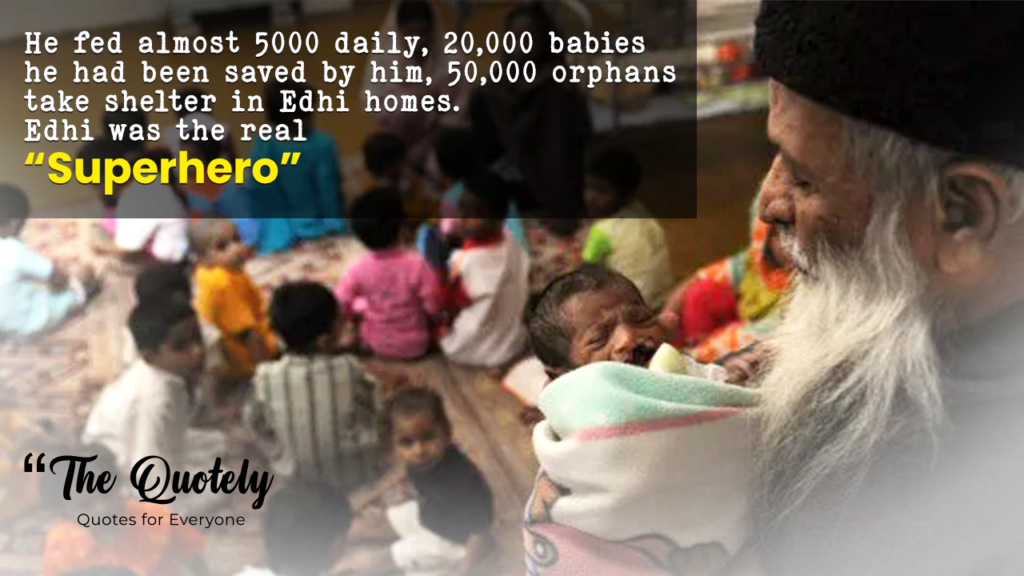
Even though 20,000 babies were turned away by swings that were put outside, Edhi centres have been saved. The Edhi Foundation does things like provide free dispensaries, hospitals, and help for people who are recovering from drug addiction. They also provide free wheelchairs, crutches, and other facilities and help for disabled people. This organisation now has offices in Ontario, New York, Dhaka, Dubai, Tokyo, Sydney, and London. It also helps people in Dhaka, Dubai, Tokyo, Sydney, and London. It still offers services in Russia, Yemen, Afghanistan, Sri Lanka, and India.
Plans for the future of foundation
The Edhi Foundation wants to build a hospital every 100 km in Pakistan, set up small village centres between big cities and small towns, and set up a ballpoint factory in Karachi to help drug addicts get better.
Edhi ambulance
The relief service started with a pick-up in 1957 and grew to be the biggest ambulance service in the world. Every year, the foundation’s ambulance service takes more than a million people to the hospital. The foundation also has an air ambulance service that volunteers can use in an emergency to get to any remote part of the country right away. As air ambulances, the foundation has two small planes and a helicopter. In the next few years, they will buy three more planes and two more helicopters.
Abdul Sattar Edhi political career
Edhi’s official biography, Khuli Kitaab, says that he started helping people in the 1950s. In 1962, he ran for and won the Basic Democracy elections, which were meant to bring attention to social welfare and the need for a welfare state. Edhi didn’t want to go to the party where President Ayub celebrated his election win over Fatima Jinnah, the motherland. When Bhutto went on the campaign trail in 1970 with the slogan “Bread, Cloth, and a House,” he also ran for office. His campaign for simplicity and honesty didn’t work, though, and he lost.
Zia-ul-Haq gave Edhi a check for Rs 500,000, but Edhi sent it back, saying that he wanted to teach people about charity and could not accept the money from the government. When General Zia-ul-Haq asked him to join his Majlis-e-Shura for social welfare in 1982, he was hesitant. “How can the great men of your esteemed assembly stand the smell of a beggar sitting next to them?” he asked. But after that, the military president asked him to join the Shura, so he did. Joining the Shura gave him a chance to look at what was going on in the ruler’s empire, but the council said he was an emotional man who didn’t know much about national and international issues because he wasn’t educated. He left the Shura, but before he left, he told General Zia-ul-Haq that racial and linguistic tensions, as well as tensions between refugees and locals, were about to come to a head. Even though no one fixed the poison, he kept picking up the dead bodies.
Pressure for Participation in Political parties
In the 1990s, the country was moving toward democracy, but Edhi had to leave the country quietly. The military and other groups asked them to join the pressure group, so they did. In 1993, he was contacted by some military officers who told him, “We need you.” At a lot of people’s urging, he agreed to give a speech at Mazar-e-Quaid on August 14. However, he could not give the speech that politicians wanted him to give. The next year, Pakistan Tehreek-e-Insaf leader Imran Khan asked Edhi to join a political pressure group in London. But he told him, “Don’t let your feelings get the best of you.
We can’t change anything except our social mission.” When General Hamid Gul went back to Pakistan, he told us that we had to save the country. But he never joined any plan to change the country through a secret group. The last thing they could do was try to link him to the murder of the editor of the weekly newspaper “Takbir.” He was so upset by this accusation that he left the country and moved to London. When he got there, he held a press conference and wrote a document saying that if he died, the news should be spread so that the conspiracy he refused to join could be found out. But after President Leghari asked him to, he went back home and did the work he knew, which was social welfare.
Abdul Sattar Edhi death
He was getting dialysis at the Sindh Institute of Urology, which is also where he died on July 8, 2016. Faisal Edhi told the media that his father’s eyes had been given to people in need, as was written in his will. He was buried on Saturday afternoon at the National Stadium in Karachi with full state honours. Prayers were said for him there. Pakistan’s Prime Minister Nawaz Sharif called for a day of mourning for his death, and the Sindh government called for three days of mourning.
Tributes after death
The Pakistan Cricket Board (PCB) decided to honour the social work of the country’s well-known social activist Abdul Sattar Edhi by putting the “logo” of the Edhi Foundation on the shirts of the ODI and T20 matches played during the tour of England. Sheharyar Khan, the head of the Pakistan Cricket Board, gave Rs 500,000 to the Edhi Foundation at a ceremony in Lahore. Najam Sethi, the head of the Pakistan Super League, also gave Rs 500,000. Pepsi, which is a sponsor of the Pakistan Cricket Board, also announced a donation of Rs 1 million at this time. Misbah-ul-Haq, Azhar Ali, and Sarfraz Ahmed, who are the captains of Pakistan in all three types of games, gave SaadEdhi Pakistan’s ODI shirt. He was also given a cricket bat signed by Pakistani players, the money from which will go to the Edhi Foundation.


